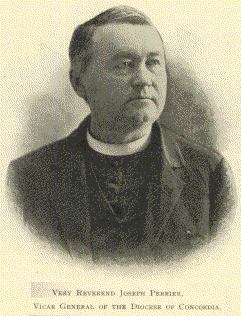
Very Reverend Joseph Perrier,
Vicar General of the Diocese of Concordia.
The Reverend Joseph Perrier is a native of Savoy, France, born in 1839. His parents were John and Petronilla Perrier, of Savoy. His paternal grandfather was a sutler or army furnisher under Napoleon.
Father Perrier's childhood was spent at Savoy, one of the loveliest spots in the universe, where many of the crown heads of Europe have castles. He was a student from the age of six to twenty-four years, a graduate of the College of St. Pierre I Albigny at eighteen years of age, then entered the University of Chambery, where he took up the science of philosophy and at twenty-three became a professor of languages.
One year later he became a priest and was sent to Gresy sur Aix, a famous resort established by Julius Caeser, and celebrated for three thousand years. Napoleon had a castle there, also Queen Victoria. When twenty-seven years of age Father Perrier came to Lawrence, Kansas, as a missionary and as a recruit to the call of Bishop Miege. He came to Topeka as a teacher of classics in the Catholic seminary in 1871.
He was soon afterward sent to Emporia, where he organized about forty missions in a circuit of four hundred miles long and one hundred wide. The territory that he covered by his individual labors is now occupied by about twenty-five priests. He was with General Sheridan when he routed the Indians from the frontier, and administered to the sick and wounded soldiers. He also administered to the railroad forces from 1868 to 1875. He endured many hardships; there were no railroads, scarcely any wagon roads over some parts of the district. The streams were not bridged and on horseback he swam the swollen rivers and creeks.
In 1880 he came to Concordia, then a town of about eight hundred people, and where a church had been established by the Reverend Father Mollier, one of the first missionaries in northwest Kansas. Reverend Father Perrier was the first resident pastor of Concordia and has labored incessantly and untiringly for the good of his church ever since. He is held in reverence and distinction as a citizen and churchman by all classes of society.
![]()
Transcribed from E.F. Hollibaugh's Biographical history of Cloud County, Kansas biographies of representative citizens. Illustrated with portraits of prominent people, cuts of homes, stock, etc. [n.p., 1903] 919p. illus., ports. 28 cm.
